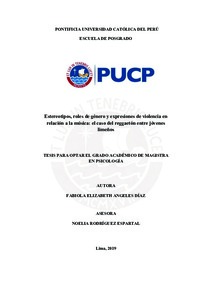| dc.contributor.advisor | Rodríguez Espartal, Noelia | |
| dc.contributor.author | Ángeles Díaz, Fabiola Elizabeth | es_ES |
| dc.date.accessioned | 2020-01-24T14:20:53Z | |
| dc.date.available | 2020-01-24T14:20:53Z | |
| dc.date.created | 2019 | |
| dc.date.issued | 2020-01-24 | |
| dc.identifier.uri | http://hdl.handle.net/20.500.12404/15687 | |
| dc.description.abstract | La música es un producto cultural importante en la vida de las personas. Está
presente en diversos espacios a lo largo de su vida, más aún en el contexto actual, donde
la tecnología facilita el contacto con ella en cualquier momento y lugar. En este sentido,
géneros musicales como el reggaetón, que tienen amplia aceptación a nivel mundial,
estarían también a disposición de la población con facilidad, especialmente de la
juventud. La presente investigación tiene como objetivo conocer el papel que ocupa el
reggaetón en la vida de los jóvenes, buscando explorar si tiene algún papel en el
fortalecimiento de la naturaleza prescriptiva de estereotipos y roles de género, así como
si contribuye a normalizar conductas violentas que puedan estar presentes en su
cotidianidad. Para ello, se llevaron a cabo dos estudios de metodología cualitativa. En el
primero se realizó un análisis crítico de discurso de 10 canciones exitosas de reggaetón.
Los resultados muestran en el contenido de las canciones, la reproducción de estereotipos
tradicionales de género, donde la mujer tiende a ser discriminada y desvalorada y, el
hombre tiene un papel dominante frente a ella. En el segundo estudio, se entrevistaron a
20 jóvenes y 3 especialistas en reggaetón respecto a las percepciones e interpretaciones
que tenían sobre este género musical. Entre los hallazgos se encuentra que la totalidad de
la muestra reconoce el contenido discriminatorio y violento hacia la mujer en el
reggaetón. Sin embargo, no habría consciencia sobre cómo la escucha cotidiana de este
género musical contribuye con la reproducción de estereotipos y roles de género
tradicionales, ni con la reproducción de conductas relacionadas con la violencia
simbólica. | es_ES |
| dc.description.abstract | Music is an important cultural product in people's lives. It is present in various
spaces throughout his life, especially in the current context, where technology facilitates
listening at any time and place. In this sense, musical genres such as reggaeton, which are
widely accepted worldwide, would also be readily available to the population, especially
youth. The purpose of this research is to know the role that reggaeton plays in the lives
of young people, seeking to explore if it has any role in strengthening the prescriptive
nature of gender stereotypes and roles, as well as if it contributes to normalizing violent
behaviors that may be present in their daily life. For this purpose, two qualitative
methodology studies were carried out. In the first one, a critical discourse analysis of 10
successful reggaeton songs was performed. The results show the reproduction of
traditional gender stereotypes in the content of the songs, where women tend to be
discriminated and undervalued, and men have a dominant role. In the second study, 20
young people and 3 specialists in reggaeton were interviewed regarding their perceptions
and interpretations of this musical genre. The findings show that the entire sample
recognizes the discriminatory and violent content towards women in reggaeton. However,
there would be no awareness of how the daily listening of this musical genre contributes
to the reproduction of traditional gender stereotypes and roles, nor to the reproduction of
behaviors related to symbolic violence. | es_ES |
| dc.description.uri | Tesis | es_ES |
| dc.language.iso | spa | es_ES |
| dc.publisher | Pontificia Universidad Católica del Perú | es_ES |
| dc.rights | info:eu-repo/semantics/openAccess | es_ES |
| dc.rights.uri | http://creativecommons.org/licenses/by-nc-nd/2.5/pe/ | * |
| dc.subject | Reggaeton | es_ES |
| dc.subject | Rol sexual | es_ES |
| dc.subject | Violencia contra la mujer | es_ES |
| dc.subject | Música--Aspectos sociales | es_ES |
| dc.title | Estereotipos, roles de género y expresiones de violencia en relación a la música: el caso del reggaetón entre jóvenes limeños | es_ES |
| dc.type | info:eu-repo/semantics/masterThesis | es_ES |
| thesis.degree.name | Maestro en Psicología | es_ES |
| thesis.degree.level | Maestría | es_ES |
| thesis.degree.grantor | Pontificia Universidad Católica del Perú. Escuela de Posgrado | es_ES |
| thesis.degree.discipline | Psicología | es_ES |
| renati.advisor.orcid | https://orcid.org/0000-0001-8540-241X | es_ES |
| renati.discipline | 313177 | es_ES |
| renati.level | https://purl.org/pe-repo/renati/level#maestro | es_ES |
| renati.type | https://purl.org/pe-repo/renati/type#tesis | es_ES |
| dc.publisher.country | PE | es_ES |
| dc.subject.ocde | https://purl.org/pe-repo/ocde/ford#5.01.00 | es_ES |






